APWU

Third Cost-of-Living Adjustment Announced
In accordance with the 2024-2027 Collective Bargaining Agreement, career employees represented by the APWU will receive a $0.12 per hour cost-of-living adjustment (COLA), effective March 7, 2026. The increase is the result of a rise in the Consumer Price Index (CPI-W). It will appear in paychecks dated March 27 (Pay Period 07-2026). The value of […]
The post Third Cost-of-Living Adjustment Announced appeared first on American Postal Workers Union.
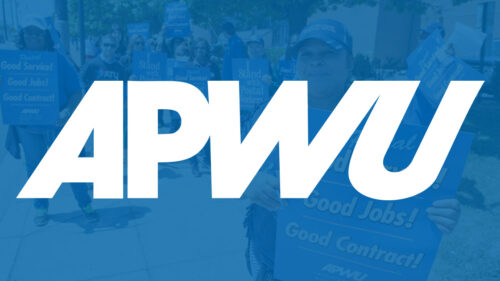
APWU President Jonathan Smith Hosts First Livestream
On Tuesday, Feb. 10, APWU President Jonathan Smith hosted his first livestream. Titled “Talk Is Cheap, Safety Matters,” President Smith spoke about the need for vigilance and action from individuals, local unions, and the national union to better protect postal workers’ health. Postal workers work every day in a dangerous, highly industrialized environment filled with […]
The post APWU President Jonathan Smith Hosts First Livestream appeared first on American Postal Workers Union.

Ongoing Enhancements to the APWU Electronic Grievance System
Industrial Relations Director Charlie Cash is pleased to announce improvements to the APWU Electronic Grievance System (EGS). The use of EGS continues to grow year after year. APWU locals can use the system to create grievances, file grievances electronically, request and exchange information with the Postal Service, keep grievants notified of the status of their […]
The post Ongoing Enhancements to the APWU Electronic Grievance System appeared first on American Postal Workers Union.

Honoring the Past, Building the Future: Celebrating Black History Month with APWU
February marks Black History Month, a time to reflect on the significant contributions African Americans have made to our country and our company. Dr. Martin Luther King Jr.’s words continue to resonate with us: “No work is insignificant. All labor that uplifts humanity has dignity and importance.” These words are particularly relevant to the American […]
The post Honoring the Past, Building the Future: Celebrating Black History Month with APWU appeared first on American Postal Workers Union.
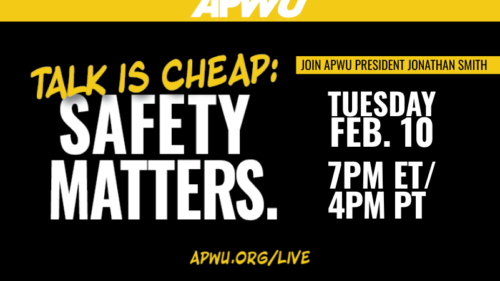
Join APWU President Jonathan Smith’s First Livestream Event on Feb. 10 at 7PM ET
APWU President Jonathan Smith will hold his first livestream event at 7 p.m. ET/4 p.m. PT on Tuesday, Feb. 10. The hour-long livestream, “Talk Is Cheap: Safety Matters” will address the safety challenges postal workers face every day and how the APWU is ready to hold management accountable to our right to a safe and […]
The post Join APWU President Jonathan Smith’s First Livestream Event on Feb. 10 at 7PM ET appeared first on American Postal Workers Union.
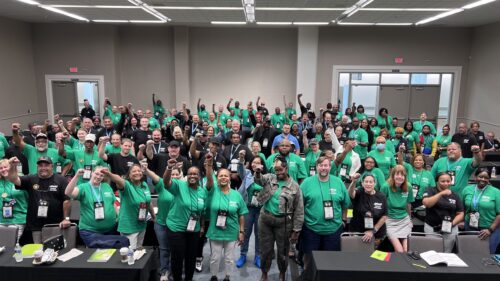
APWU Electronic Grievance System to Undergo Maintenance This Weekend
The American Postal Workers Union’s Electronic Grievance System will be offline intermittently for scheduled maintenance and upgrades beginning Friday evening. The EGS will undergo a software release starting at 7 pm ET on Jan. 30, with an expected outage of approximately one hour, according to the EGS system provider. Additional network maintenance and hardware upgrades […]
The post APWU Electronic Grievance System to Undergo Maintenance This Weekend appeared first on American Postal Workers Union.
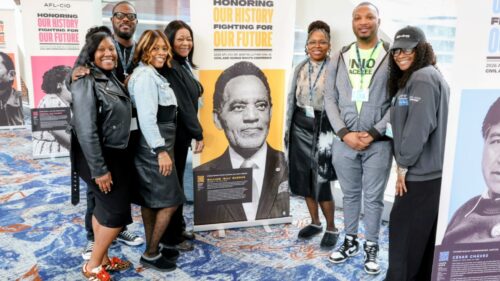
APWU Represent at the 2026 AFL-CIO Martin Luther King Jr. Conference
APWU attended the 2026 AFL-CIO Martin Luther King Jr. Civil and Human Rights Conference, which took place January 15-18 in Baltimore, MD. APWU President Jonathan Smith, Executive Vice-President Debby Szeredy, Secretary-Treasurer Elizabeth “Liz” Powell, and Legislative & Political Director Judy Beard were the resident officers who represented our union, along with members from across the […]
The post APWU Represent at the 2026 AFL-CIO Martin Luther King Jr. Conference appeared first on American Postal Workers Union.

Honoring Dr. Martin Luther King Day
Today we honor the legacy of a true champion of justice and equality, Dr. Martin Luther King Jr. As we celebrate his birthday, let’s remember his powerful words as we put effort into action: “No work is insignificant. All labor that uplifts humanity has dignity and importance and should be undertaken with painstaking excellence.” To […]
The post Honoring Dr. Martin Luther King Day appeared first on American Postal Workers Union.
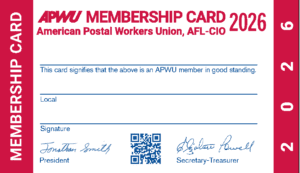
The Importance of Your APWU Membership Card
(This article appeared in the January/February 2026 issue of The American Postal Worker magazine) In January, APWU members will receive their 2026 membership card. While this may seem like a simple piece of plastic, it carries significant meaning. Your membership card represents your connection to a collective force dedicated to protecting postal workers’ rights, benefits, […]
The post The Importance of Your APWU Membership Card appeared first on American Postal Workers Union.
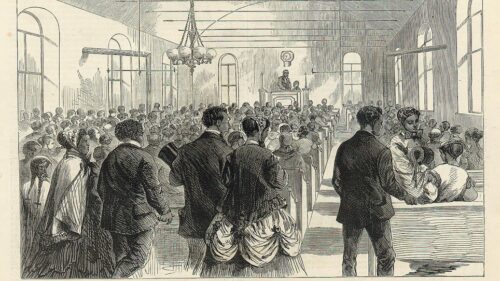
Labor History: First National Union Formed for Black Workers; Akron Rubber Workers Innovate Strike Tactics
(This article appeared in the January/February 2026 issue of The American Postal Worker magazine) First National Union Formed to Address Black Workers’ Needs During Reconstruction Era Jan. 5, 1869: Black workers formed the Colored National Labor Union (CNLU) during the National Colored Convention (NCC) in Washington, DC. The convention focused on securing the right to […]
The post Labor History: First National Union Formed for Black Workers; Akron Rubber Workers Innovate Strike Tactics appeared first on American Postal Workers Union.
